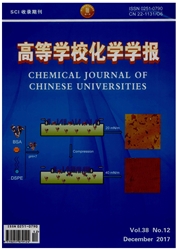

 中文摘要:
中文摘要:
为了更好地理解贻贝在表面的黏附机理,实现水下胶黏,采用分子动力学方法研究了多巴在自组装膜上的黏附性:采用伞形取样和加权柱状图分析方法计算了多巴在不同自组装膜表面的黏附自由能,使用拉伸分子动力学模拟研究了多巴在不同自组装膜表面上黏附后的脱附力.结果表明,多巴在带负电的羧基自组装膜上的黏附能比在带正电的氨基自组装膜上的大,多巴更容易黏附到带负电表面;多巴在带电表面的黏附能比未带电表面的黏附能更强,表明在带电表面黏附更稳定.进一步分析了多巴在不同表面的取向分布,发现多巴与不同表面相互作用的方式不同:与疏水表面主要通过苯环相互作用;与亲水表面主要通过羟基相互作用;与负电表面主要通过氨基相互作用;与正电表面主要通过羧基相互作用.通过模拟比较了多巴在不同自组装膜上的脱附力,发现多巴在带电表面的脱附力比在未带电表面的大,与黏附能的趋势一致.对比4种非带电表面的脱附力,发现多巴在疏水性甲基自组装膜表面的脱附力最大,黏附更稳定,随着表面疏水性的增加,脱附力增大,黏附稳定性增强.本工作可为研发新型水下胶黏剂提供理论指导.
 英文摘要:
英文摘要:
Mussels use a variety of 3,4-dihydroxy-phenylalanine (DOPA) rich proteins specifically tailored to adhering onto wet surfaces. To facilitate the development of next generation of aqueous adhesives, in this work, umbrella sampling and weighted histogram analysis method was used to calculate the binding free energy of DOPA on different self-assembled monolayers; steered molecular dynamics simulations were performed to study the desorption force of DOPA on them. Simulation results show that, the adhesion free energy of DOPA on the negatively charged COO--SAM surface is larger than that on the positively charged NH3-SAM surface. DOPA is more easily adhered to the negative charged surfaces; on the charged surface, the higher adhesion free energy, indicated higher stability. Further analysis of the orientation distribution of DOPA on different sur- faces reveals different interaction mechanisms between DOPA and different surfaces. It binds on the hydropho- bic surface through benzene ring, while on the hydrophilic surface through hydroxyl. DOPA interacts: with the negatively c Comparison harged surface and the positively charged surface by amino and carboxyl groups, respectively. of desorption forces for DOPA on different self-assembled monolayers indicates that des0rption forces on charged surfacesare greater than those on neutral surfaces, which is consistent with the trend of adhe- sion. Among the neutral SAMs, we also find that on the hydrophobic CH3-SAM, the desorption force is the maximum, indicating stronger adhesion stability. With the increase of hydrophobicity, both desorption force and adhesion stability increases. This work helps to understand adhesion mechanism of mussel on different sur- faces, and provide theoretical insights for developing new underwater adhesives.
 同期刊论文项目
同期刊论文项目
 同项目期刊论文
同项目期刊论文
 期刊信息
期刊信息
